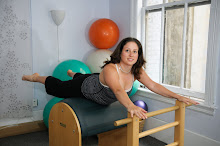
I just updated my facebook fan page with my thought of the day.
Here it is:
I have so many things that I want to share with you today. I have been thinking about the psoas muscle over the past couple of days. I have two clients who are trying to wrap their head around the concept. Liz Koch wrote a book (which I own, so let me know if you want to borrow it) solely dedicated to the psoas muscle. The psoas muscle is actually the iliopsoas muscle. You can check out her website www.coreawareness.com to learn more. I love that her approach is holistic but not in an annoying new-agey kind of way. Okay, maybe some of that music and psoas stuff doesn't really do it for me, but this woman really knows her stuff. When people say that their back hurts, I first try and figure out how this might relate to hip tightness and alignment.
In the summary below, she basically covers the main reason we have lower back pain. It has to do with gravity and how our bodies distribute the weight. She calls it the Pelvic Keystone:
"Gravity passes directly through the bony skeletal core via the spine, legs and feet; it does so by transferring weight from one spine to two legs through the pelvic basin. What creates and maintains pelvic integrity is a web of ligaments called the sacral iliac joints – this pelvic keystone transfers but does not bear weight. The psoas protects and attempts to prevent injury to the lumbar spine, pelvic keystone and nervous system. When torn, frozen or lax these proprioceptive rich pelvic ligaments communicate disturbed weight bearing signals that demand that the psoas, as messenger of the central nervous system, get involved. If weight does not move smoothly through the pelvis (evident by a torque, tipped or instable pelvic basin) it will be impossible to maintain a supple psoas."
So basically what Koch is saying is that we need to maintain alignment and strength of the psoas muscle so that we don't overuse or abuse it. I have worked with Yogis and Yoginis who are incredibly flexible but have very weak psoas muscles. I have worked with strong athletes who don't know how to release their psoas muscles for better athletic performance. And then there are most of us who simply suffer from lower back pain every so often, and there is a simple answer: psoas health. I could go on about this, but I truly recommend Liz Koch's expertise on the issue.
 I just updated my facebook fan page with my thought of the day.
I just updated my facebook fan page with my thought of the day.  I just updated my facebook fan page with my thought of the day.
I just updated my facebook fan page with my thought of the day. 
No comments:
Post a Comment